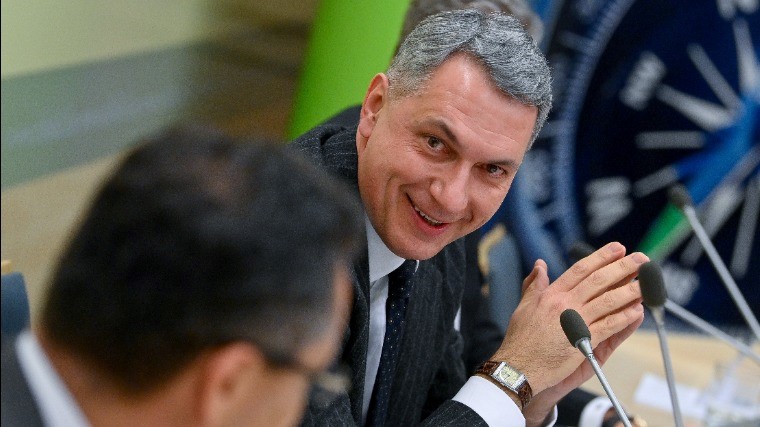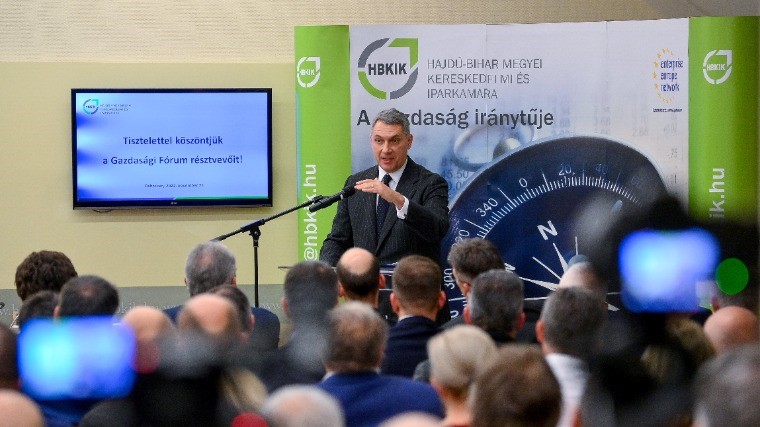According to János Lázár, the state's investment policy should serve economic growth. On Thursday in Debrecen, at the economic forum of the Hajdú-Bihar Chamber of Commerce and Industry, the Minister of Construction and Investment asked for help from the players in the sector to implement his plans, and at the same time offered them a partnership.
He put it this way: as investment minister, he began his work by not laying foundation stones, but picking them up: the government suspended 302 investments this year, worth HUF 2,140 billion.
"This is the cost of war on the investment front for Hungary," said János Lázár. He also pointed out that Hungary's gas costs in 2021 were 7 billion euros, this year 17 billion euros, that is, 10 billion resources were lost.
Another consequence of the war is that all of the investments that have been started and are yet to be completed lack funds: there are 351 such investments in the country, with a cost of HUF 3,410 billion, while there was a 15-20 percent price increase in the construction industry, which means that there is a HUF 500-600 billion shortage of funds for the current investments - brushed it off.
At the same time, he noted that in the past 12 years, the Hungarian state contributed HUF 25,000 billion to the development and growth of the country, 70 percent of which was infrastructural development.
János Lázár said that there will be a fundamental change in the development policy, for him the countryside is first, the support of rural investments, constructions and transport developments.
To this end, two legislative packages are being prepared, which will completely reorganize the extremely vulnerable construction sector of the Hungarian economy, which employs 400,000 people.
He called the most important goal of the investment framework law being prepared to continue state developments for the sake of the public good, to improve the preparation of state investments, "from Hungarian raw materials, with Hungarian know-how, from Hungarian work, to produce Hungarian profit".
He added that the entire Hungarian building code will be revised with the involvement of professional organizations. The head of the ministry promised to break down obstacles and bureaucracy, one of the goals of which is that "Hungary moves to a level of civilization", at the same time, as he said, "civilian good taste must be enforced in investments... good, better, must be built with good taste".
János Lázár also spoke about the need to strengthen the competitiveness of Hungarian businesses so that "the Hungarian construction industry can stand its ground in Hungary." You have to be not only Hungarian, but also good, he added.
The minister called it an important goal that in the future it would not be possible to decide on investments without the consent of the local communities.
According to the politician, the country's situation will be significantly influenced by the energy situation this year and next year: the goal is to be able to guarantee the population's energy supply in the long term, and the government reshuffle took place for this purpose.
At the economic forum, János Lázár praised the work of László Palkovics, who transformed Hungarian industry and transport during his ministry and did a lot for the development of Debrecen.
He emphasized the importance of mobility, which has not only transport but also social aspects. He mentioned as an example that if someone has to travel more than an hour to work, sooner or later they will move closer to it. It is therefore important to modernize the 32,000 kilometers of lower-order routes managed by the state, make the 174 district centers more accessible, and ensure mobility.

He also pointed out that 50 percent of the 8,500-kilometer railway tracks have speed limits (15 percent in Austria), and that Hungarian trains are delayed 150-200 hours a day, which essentially makes transportation impossible.
Regarding the development of the transport infrastructure, he noted that "Hungary is a stable bridge country between East and West", and Záhony is the country's gateway to the East. He also spoke about the intention that "not all roads lead to Budapest, development should not be Budapest-centered", but he added: the capital is also doing well with it, the capital of the nation is given everything, but that cannot mean that the countryside does not develop.
"The country must be put on the rails," the minister referred to the railway development plans, but drew attention to the fact that, until this is realized, "the persecution of motorists in Hungary must be stopped", "car users cannot be disabled, they must even be supported", he said.
János Lázár advocates the introduction of consolidated transport county passes. In justification, he said: In Budapest and its agglomeration, you can use 40-45 thousand flights with a monthly pass of HUF 9,500, the same amount of money is enough to travel ten kilometers in Hajdú-Bihar, for example.
At the end of the economic forum, János Lázár mentioned some specific priority development plans. He highlighted the construction of the Budapest-Belgrade railway line, which is a strategic interest of Hungary, the construction of the V0 southern circular railway, the renewal of the entire HÉV system, and the high-speed railway between Budapest and Cluj.
Among the ministry's plans for Debrecen, the implementation of the eastern bypass, the construction of the intermodal center, the construction of the Debrecen-Nagyvárad tramway, the development of the Debrecen airport into a regional airport with a traffic of two million, and the four-lane highway 47 between Debrecen and Békéscsaba - introduced by János Lázár.
Source: MTI
Photos: MTI/Zsolt Czeglédi












